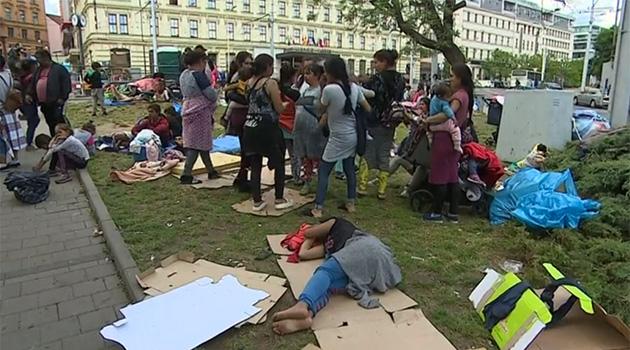Tomáš Ščuka: In the Czech Republic, the hatred toward Romani refugees is a warning sign

In the last few years we have been witnessing unusual times caused by events in our own country and globally. After several waves of the COVID-19 pandemic, we are following live the 21st-century wartime conflict in Ukraine.
Russia’s aggression has lasted three months already and cost Ukraine many civilian lives. Innocent people are dying every day.
Children and women are frequently among the victims. As of 3 June, more than 6.5 million people have fled Ukraine because of the war.
The countries of the European Union into which the refugees are arriving have shown them enormous solidarity. The same applied during the pandemic, when people aided each other according to their opportunities to do so.
The Czech Republic has decidedly not fallen behind in this regard! The Czech Government is playing an important role in aiding Ukraine.
Whether we’re talking about the financial form of aid, material aid, or providing temporary protection to refugees, that is the case. More than 300 000 people have been provided accommodation and protection here.
The entire system for registering refugees worked without any problems up until a certain point in time. The change happened in April, when bigger cities in the Czech Republic noticed the arrival of Romani refugees from Ukraine.
Specifically, these were big groups of children with their mothers, all of them Romani. Suddenly the registration system that had been so praised for working so well began to have problems.
Difficulties with registering these groups, including arranging dignified housing for them, began in different regions. The consequence is the fact that for more than two months we, as one of the societies that is showing the most solidarity with Ukraine in the world, have given little children (very often even infants) and women no choice but to sleep outdoors.
One of the groups that is the most vulnerable has been spending the night on the floors of railway stations or on the ground in parks and other public spaces. Even though we lack even the most basic information about these people, the Regional Assistance Centers, together with several municipalities, are able to differentiate them quite quickly from the other 300 000 refugees who were welcomed here so smoothly.
Well, what is termed the narrative (the dominant story) about “criminal elements”, “inadaptables” and “troublemakers” is enormously powerful! Could it be a coincidence that the question of refugees holding dual citizenship [Hungarian and Ukrainian] is one we began dealing with so late in this process?
In other words, is it random that we happened to begin asking these questions after refugees of Romani origin began arriving? Did the Czech administration feel it was urgent to address the consequences of Orbán’s citizenship policy for more than 99 % of the registered applicants from Ukraine?
I do not recall it being an issue before. Unfortunately, the approach being taken by some politicians to this issue just confirms my feelings and impressions.
Public efforts to cast doubt on the situation of these most-endangered groups of refugees, solely on the basis of stereotypes, and a lack of courage to change the climate in society toward one of better interethnic coexistence is something I consider to be the greatest possible failure of these democratically-elected representatives! Morally and professionally.
If we are to make progress and catch up with advanced, free societies, we cannot ignore the elimination of fundamental human rights. I am concerned that the enormous solidarity among the Czechs to aid Ukraine at this difficult time is not enough to hide the existing Romaphobia here.
After all, we are speaking of a mere 1 500 people. These are children and their mothers seeking a dignified, safe environment in which to wait out the crisis of this war, but instead they have been facing the attention of the media for several weeks, something in which they are certainly not interested.
Mainly, this never would have happened at all if we had not condemned these 1 500 people in advance, if we had provided them the same temporary protection as everybody else. If it were not for the nonprofit sector and volunteers, we would be dealing with much greater harms having been done.
I see a small point of light among some of the civic groups that aid all refugees irrespective of their origin. However, it is the Government above all that most face up to the position of the Romani minority and its development.
As long as the refugees sleeping outdoors are just Romani ones, of course, it is difficult to contemplate the change that is necessary. Paľikerav tumange.
First published in the biweekly newspaper Romano hangos
